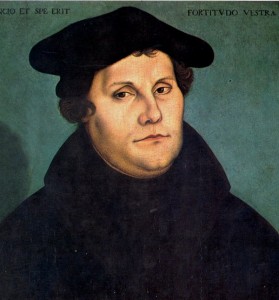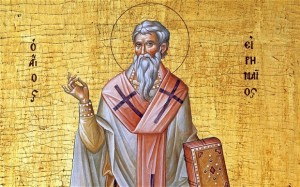PREFACE
Almost 500 years ago—on October 31, 1517—an Augustinian monk named Martin Luther posted his Ninety-Five Theses on the Wittenberg door. Looking ahead to the 500th anniversary of what is today called the Reformation, Lutheran and Evangelical churches are even now planning for a grand celebration to mark the date.
According to the Evangelical Church in Germany (EKD), the great Reformers—Luther, Melanchthon, Zwingli, Calvin and others—are among the prime sources of ideas in religious, political and intellectual history.
Anyway, that’s one way of looking at it. Another way was proposed earlier this year by His Eminence Cardinal Kurt Koch, head of the Pontifical Council for Promoting Christian Unity.
The Pontifical Council has its origins during the Second Vatican Council, when Pope John XXIII expressed his desire that the Catholic Church become involved in the contemporary ecumenical movement. On June 5, 1960, the Pope established a “Secretariat for Promoting Christian Unity” as one of the preparatory commissions for the Council, and he appointed Cardinal Augustin Bea as its first president.
As current head of the Pontifical Council for Promoting Christian Unity, Cardinal Koch is a mediating influence in the Church—seeking ways that the Catholic Church can collaborate with adherents of other faiths.
This time, though, the Cardinal says no. The Reformation is not, from the Catholic perspective, a great and grand holiday to be celebrated, a cause for rejoicing. Rather, it is a sad remembrance, the day which marked the beginning of the fracturing of the Church into some more than 28,000 denominations. The 500th anniversary of the Reformation cannot, he says, be called a holiday. It is a celebration of sin—the sin of pride and divisiveness which thwarted the expressed will of Jesus that we all might be one, just as he and the Father are one.
“We can not celebrate sin,” said Cardinal Koch. He went on to note that his remarks may well be branded “anti-ecumenical” by persons of other faiths.
It is against this dramatic backdrop that I repost a blog from last year, “That They May All Be One: From the Reformation to Christian Unity.”
THAT THEY MAY ALL BE ONE:
FROM THE REFORMATION TO CHRISTIAN UNITY
I pray not only for them, but also for those who will believe in me through their word, so that they may all be one, as you, Father, are in me and I in you, that they also may be in us, that the world may believe that you sent me.
And I have given them the glory you gave me, so that they may be one, as we are one, I in them and you in me, that they may be brought to perfection as one, that the world may know that you sent me, and that you loved them even as you loved me.
–John 17:20-23
In sixteenth century Germany, an Augustinian friar by the name of Martin Luther became concerned about things he saw happening in the Church. He saw some priests, even some bishops, who were engaged in practices which he considered to be wrong—particularly the sale of indulgences.
And there was, indeed, a moral problem at the time: Corruption had crept into the Church. Pope Leo X had authorized the sale of special “jubilee indulgences” in the cities and principalities of Germany. The indulgences were plenary, meaning that for those who purchased them, all sin and eternal and temporal punishment would be forgiven. Half of the money raised from the sale of indulgences would be used to finance the building of St. Peter’s Basilica in Rome; the other half would be used by the archbishop of Mainz to pay off a loan.
Luther drafted a series of ninety-five statements in Latin—offering his reflections on indulgences, good works, repentance and other topics. The Castle Church in Wittenberg faced the main thoroughfare, and the heavy church door served as a public bulletin board, a place for posting important notices. So it was that on October 31, 1517, Martin Luther nailed his list of “Ninety-Five Theses” to the door of the Castle Church.
Unintended Consequences – The Splitting of the Christian Church
Luther had hoped that his Theses would initiate an academic discussion—not serve as the agenda for a major reform of the Catholic Church.
However, within weeks the Theses were translated into German, then reproduced using the new moveable-type printing press. They were widely circulated through Germany, and soon became a topic for discussion through all of Europe. Three years later, amid the international attention, Luther was excommunicated by the pope and declared a heretic and outlaw. The Reformation had begun.
Just as Martin Luther did not anticipate the huge response his Ninety-Five Theses would receive, he did not foresee the further splintering of Protestantism into some 38,000 Christian denominations (the number reported in the Atlas of World Christianity, published in 2010). If, as Luther’s movement proposed, there is no authority vested in the Church, then there is no reason not to break off and begin a new movement within Christianity; and in less than 500 years, the result has been the splintering of Christ’s Church into ever more movements and denominations. It is a great scandal that Christ’s high priestly prayer to the Father—that we may be one in order that the world will see—has been thwarted.
The Week of Prayer for Christian Unity: Reversing the Trend Toward Division
In 1908 Father Paul Wattson, founder of an Anglican religious community which later became part of the Catholic Church, established a “Week of Prayer for Christian Unity”–a week to pray with our Christian brothers and sisters of other denominations, and to celebrate those areas where we find common ground. His initiative received the blessing of Pope St. Pius X and was later promoted by Pope Benedict XV, who encouraged its celebration throughout the Catholic Church.
The Second Vatican Council reaffirmed the importance of this quest for unity among followers of Jesus Christ.
Each year the theme of the week is chosen by an ecumenical group representing a different region of the world. This year’s theme, “All shall be changed by the victory of Jesus Christ our Lord,” was selected by representatives of the Catholic Church and the Polish Ecumenical Council. It is drawn from the First Letter of St. Paul to the Corinthians.
Wednesday, January 18 began the 2012 Week of Prayer for Christian Unity. Pope Benedict XVI, addressing more than 8,000 pilgrims at the Angelus address in St. Peter’s Square on January 22, called the quest for Christian unity “a common response to the spiritual hunger of our times.” He acknowledged that the division within the community of believers is a great challenge for new evangelization, which may be more fruitful if all Christians proclaim together the truth of the Gospel of Jesus Christ and give a joint response to the spiritual hunger of our times.
Pope Benedict reminded us that according to St. Paul, the achievement of full unity “demands that we allow ourselves to be transformed to an ever more perfect image of Christ. The unity for which we pray requires an interior conversion, both in communion and personnel. It is not just a question of cordiality and cooperation, we must strengthen our faith in God.”










